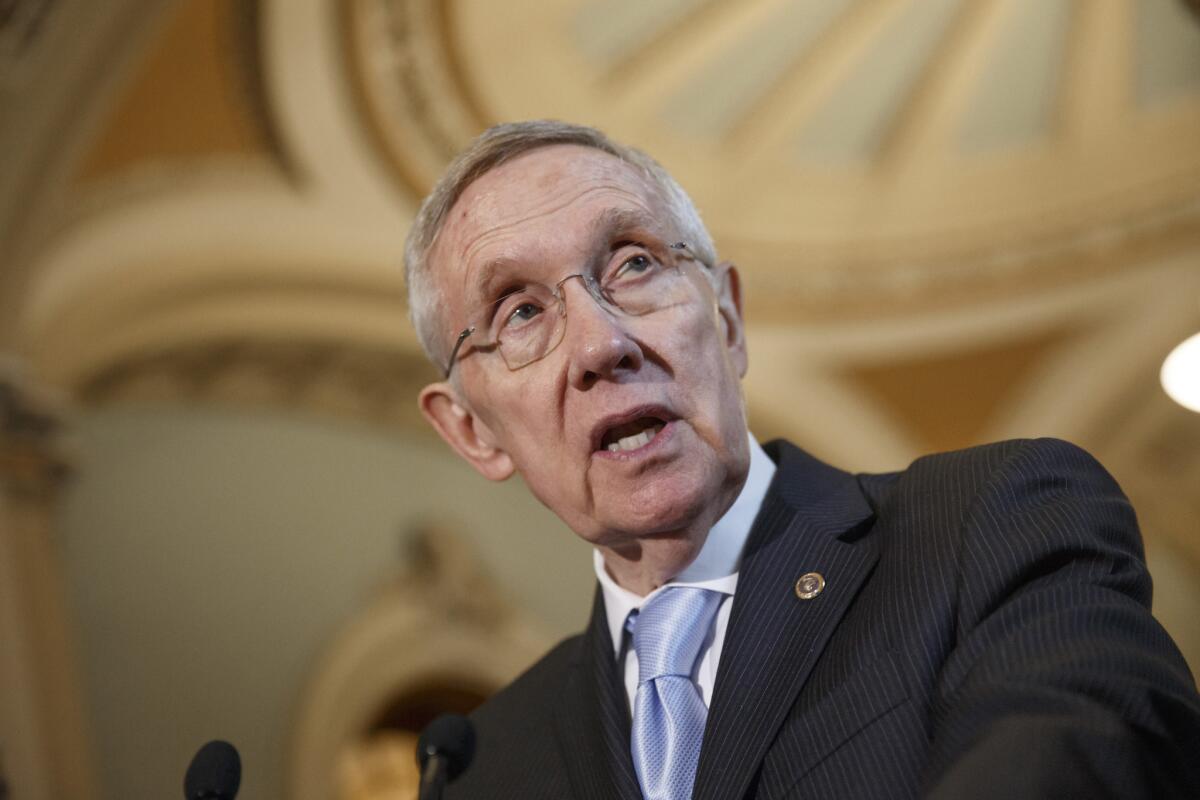Opinion: Voters favor compromise, but in what direction?

According to Wall Street Journal columnist Gerald Seib, a new Journal/NBC News poll found that half of the voters surveyed preferred a candidate who would compromise in order to reach consensus on a bill, compared to 42% that favored a candidate who wouldn’t.
That’s a huge change from four years ago, when 57% said they’d rather vote for an uncompromising, my-way-or-the-highway kind of politician, Seib reported. At the time, only about a third said they’d prefer someone willing to bend a bit in order to get something done.
But that doesn’t tell us much, if anything, about where voters are headed in November. All it tells us is that roughly half the country doesn’t like the status quo. Considering that Congress has been wildly unpopular for the past four years, that’s no surprise.
Nor do the newly warm and fuzzy sentiments toward compromise clearly favor one party over the other, given that each side blames the other for the gridlock.
Republicans argue that Senate Democrats -- and particularly Senate Majority Leader Harry Reid (D-Nev.) -- are the ones digging in their heels. Most of the bills that the House GOP majority has pushed through that chamber (typically with little support from Democrats) have disappeared as soon as they’ve crossed the Capitol to the Senate, where Reid’s stranglehold over debates makes it hard for Republicans even to offer amendments.
Democrats, meanwhile, say Republicans have spent almost all their time trying to score political points and stymie President Obama rather than offering real solutions to the country’s problems. One vivid example is the lengthy government shutdown in October 2013, which happened after House Republicans tried to use the annual appropriations bills to “defund Obamacare.”
Clearly, whether you blame Republicans or Democrats for gridlock depends on which team you’re on.
It’s also worth remembering that other polls over the years have shown strong public support for compromise. But the polls also show that many voters equate “compromise” with “capitulating to my side’s demands,” rather than “splitting the difference.”
In other words, voters may want their representatives to get along better, but they don’t seem to want them to concede much, if anything, to the other side.
Still, Seib contends that the results of this year’s primaries show that the public’s enthusiasm for real give-and-take politics may be growing. As proof, he cites the ability of most GOP incumbents to defeat challengers aligned with the party’s uncompromising tea party wing. But that may simply demonstrate how well those incumbents have learned from the mistakes mainstream Republicans made in 2012, and how much of the tea party message they’ve co-opted.
Voters don’t get to cast a ballot on gridlock. In this election cycle, they can only vote for the House member and, in two-thirds of the states in this election cycle, the senators who represent them. It would take a Democratic tsunami for that party to reclaim control of the House, and no one expects that to happen. So if changing the status quo is your No. 1 goal, your only option this year is to replace a Senate Democrat with a Republican -- a choice available only to voters in 21 states.
As it happens, the odds favor Republicans taking control of the Senate. But if the GOP does win back the majority, neither Democrats nor Republicans would likely see that result as a mandate to start cutting deals. Instead, they will most likely see it as a predictable midterm loss for the party in the White House. Considering that President Obama is almost as unpopular as Ebola at the moment, he’s a logical scapegoat.
That’s not to say that gridlock is embedded, tick-like, into our political system. Lawmakers don’t care for it either. No matter what their politics are, they’re not having fun being so ineffectual -- whether their goal was to rein in the massive federal bureaucracy or extend help to more of those who need it.
One intriguing possibility is that Senate Republicans will be powerfully motivated to improve Congress’ productivity if they win in November. That’s because they’ll have so many seats to defend in 2016 -- about two dozen, compared to only 10 or so Democratic seats -- that they’ll want to show they can govern better than the other party has.
And yet the deck may be stacked against compromise, even when the party in control has the incentive and voters want it.
Senate Democrats may conclude, as minority parties often do, that the best way to reclaim the majority is throw so much sand in the gears that their opponents can’t accomplish anything. Meanwhile, Republicans may not be able to resist the temptation to force epic showdowns with the lame duck in the White House, particularly over budget, tax and entitlement-related measures that Democrats would not be permitted to filibuster.
Such a showdown is likely to come early in 2015, in fact, when the federal government will reach its debt ceiling again. Republicans may not be willing to vote in favor of more borrowing, even if the alternative is a catastrophic government default, unless they tie it to deep cuts in entitlement programs (such as Medicaid or the insurance premium subsidies in Obamacare) or a tax overhaul that slashes rates.
I know, I know -- some readers believe the debt limit doesn’t really have to be raised because the government can get by with less. But if that were true, House Republicans wouldn’t have approved four consecutive deficit-cutting “austerity” budgets that require huge amounts of additional borrowing.
But I digress. The bottom line here is that divided government will remain in Washington for at least two more years. Whoever holds the majority in the Senate will be motivated to get more done, if for no other reason than to improve their chances of holding on to power after 2016. Yet those aspirations will still run smack into a House GOP majority that wants to go much further to the right than Democrats will let them go.
There are scenarios that conjure up visions of the more productive Congress that voters seem to be saying they want. They’re just hard to believe.
Follow Healey’s intermittent Twitter feed: @jcahealey
More to Read
A cure for the common opinion
Get thought-provoking perspectives with our weekly newsletter.
You may occasionally receive promotional content from the Los Angeles Times.











